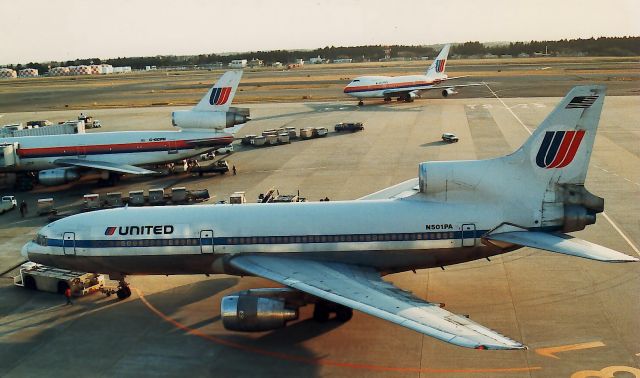Todos
 |
|
Lockheed L-1011 TriStar (N501PA)
This is the picture taken before about 30 years,
but a photo date isn't recording a photo date then,
and is unclear.
Comments
The other two planes in the photo are very interesting. The DC-10 cargo appears to have a UK tail number (looks like G-OCPH) which is very strange for a United Airways plane. The B-747 in the background looks like a 747SP. Only 45 were built.
Looks like it was an Ex Pan Am that went to United and then to Delta Retired 2000
http://www.airfleets.net/ficheapp/plane-l10-1176.htm
http://www.airfleets.net/ficheapp/plane-l10-1176.htm
United acquired So.America routes (and some airplanes) from Pan Am in 1985. 1987???. You may see anything at Narita.
The DC-10 has a Canadian registration and I seem to recall United and CPAir trading DC-10-10 for DC-10-30's around the time they took over Pan AM. The L1011 was the first L1011-500 that went to Pan AM.
Everyone, thank you for seeing the photos. Well, DC - 10 in this picture is C - GCPH. I posted a photo of C - GCPH that was taken alone in the past,
WHO copied Who. Did DOUGLAS copy Lockheed Or vise versa.
The question having to do with did "Douglas copy Lockheed or vice versa?" The airplanes were designed and built at almost the same time in S.California. Of course, the companies were competing with various airlines for orders - always a major issue in the marketing of a new airplane.
The Douglas actually got into service first as the Lockheed choice of engine, the RB-211 was running into developmental problems. Lockheed eventually delivered on a major order from Eastern Air Lines - among others - and went on to produce a number of air frames. Douglas got more orders but the DC-10 was plagued with a number of fatal crashes and even when the MD-11 was developed, the number of crashes continued. Douglas was also able to sell a number of tankers to the USAF which were known as the KC-10. Both good airplanes, but now relegated to history as the long range, heavy twin airplanes take over.
The Douglas actually got into service first as the Lockheed choice of engine, the RB-211 was running into developmental problems. Lockheed eventually delivered on a major order from Eastern Air Lines - among others - and went on to produce a number of air frames. Douglas got more orders but the DC-10 was plagued with a number of fatal crashes and even when the MD-11 was developed, the number of crashes continued. Douglas was also able to sell a number of tankers to the USAF which were known as the KC-10. Both good airplanes, but now relegated to history as the long range, heavy twin airplanes take over.
Can you say "hurrily put into service"?
DeCeased-10 and MayDay-11 :-/
Another amazing picture Sam thanks for keeping a bygone era alive
It's sad the 747s and md 11s are fading out of popularity as passenger liners
It's sad the 747s and md 11s are fading out of popularity as passenger liners
Yoshihiro Oshita... thanks to You for sharing this photo with us!
The DC-10 was hurried into service. After the 747, there was a panic push put on by manufacturers to produce a mid-range smaller airport plane. McDonnell Douglas pushed the DC-10 into service way too soon. Lockheed built a much better plane, but seeing as the DC-10 beat the L-1011 to the market, Lockheed had only 250 orders for the L-1011 airplane variations. To keep production going and make money, 500 were needed to sell. That's a big reason why the 1011 was discontinued. I've flown on both and prefer the L-1011 50-1 vs. the DC-10. I don't remember if it was CP Air or Canadian Airlines that swapped DC-10 models with United. Air Canada bought/merged with Canadian, i'm not sure of the year though. A quirk of the DC-10 is that in order to enter the cockpit, you had a step up. I've never seen that feature on any other plane I've flown on, and I've been on many types.
I think the 747SP probably came from Pan AM since they were one of the few, if only, airline that flew this model. Because it was smaller and lighter, it could go non-stop to many Pan AM destinations. The L-1011 could have come from National. I believe United bought them and flew them for a very short time. I had a United Mech tell me that everything that came from Pan Am was a pile of crap. Once United started using these they got rid of them FAST!
The L 1011 isn't in United colors. Can anyone ID the colors? Might be National.
Tale number tells all....Pan AM...PA.
Thank you for having lots of comments. I am studying very much when I am reading. Although it is an aviation industry with many absorption mergers, it is a lonely decline of airline companies.
I worked at LAX for united in the late 80's for a short while. Every now and then, one would show up. UAL used them in their Asia-Pacific routes mainly to Japan and the expanding China routes. They were based if I recall at SFO. Correct, they were not with the UAL fleet for very long. I had a couple of years experience with the Tristars. At the Lockheed Palmdale factory and Ontario Air Service 145 MRO. A great aircraft to maintain although would have loved to see them with a different engine. Not a big 211 fan.
That is one of the ultra rare, super long range Tristar 500's. It is shorter than all the other L10-11's like the 747-SP is shorter than all the other queens. It also has the aerodynamic strake under the #2 engine intake. The Tristar 250's also had it. The configuration of the #2 engine inlet path is the only flaw it had under the DC10. The "S" shaped path that the intake air had to travel cost the L10-11 a few mph at cruise. The DC10 was faster.. It is an ex-PanAm bird from PA's first death.
TWA owned a few L-10's as well.
Even so, it seems that TWA's L-10 holding number as of 1986 boasted 35 aircraft.
Yoshihiro, yes. We had one TWA L-10 fly out of IND once a week back in those days, lol.
ATA - American Trans Air had some L-10's as well. Back in those days they were primarily a charter airline. In 1986 I flew an L-10 from IND to LAS. It was my first time on an L-10. Loved it, great plane!
American Trance's L-10 (N185AT, N193AT) is also a short period, but there was a charter flight to NRT. I will post pictures soon.
What a great photo study and made special by the fact that these three aircraft while having the same logo on their tails actually have some design characteristics related specifically to their verticals tails and the influence they have on the axis of yaw. Notice how the tail the B747SP seems much larger than the a standard B747? That's not an optical illusion. The SP tail is in fact some 5 feet taller. This allowed a larger fin and rudder surface area necessary to counter outboard engine asymmetric conditions. This is simple "weight x arm = turning moments" and was essentially due to the shorter body resulting in less rudder influence had the standard tail been used.
In another post the choice of ducting was discussed in relation to the DC 10 straight through engine and L-1011 'S' ducting. In fact the design differences adopted again affected the yaw axis and rudder influence. The L-1011 has a bigger rudder with more influence and when considering asymmetric operating conditions, this allowed the engines to mounted further out on the wing. This resulted in better performance. However, as is always with aircraft design the compromise was the extra drag associated with the duct. Look at images of both aircraft head on and top down and the difference is obvious. It made it real easy to determine what I was looking at when a tri-engine went overhead.
In another post the choice of ducting was discussed in relation to the DC 10 straight through engine and L-1011 'S' ducting. In fact the design differences adopted again affected the yaw axis and rudder influence. The L-1011 has a bigger rudder with more influence and when considering asymmetric operating conditions, this allowed the engines to mounted further out on the wing. This resulted in better performance. However, as is always with aircraft design the compromise was the extra drag associated with the duct. Look at images of both aircraft head on and top down and the difference is obvious. It made it real easy to determine what I was looking at when a tri-engine went overhead.
Yoshihiro. Didn't you say you were going to post an American Trans Air L-10. Would love to see it again. Remember I said I flew one from IND to LAS in 1986. It was my very first L-10 flight. Thanks buddy....Ron
I recently posted a picture of the American Trans L-10 (N193AT). Registration is hard to decipher according to digitization of old photos. I will also post pictures of N185AT. It is a pity that this is blocked by the spotlight pillar.
|
REGISTRO DE ACTIVIDAD
¿Deseas un historial completo para N501PA a partir de 1998? Compra ahora. Recíbelo dentro de una hora.
|
| Fecha | Aeronave | Origen | Destino | Salida | Llegada | Duración |
|---|---|---|---|---|---|---|
| No Recent History Data | ||||||
| Los usuarios básicos (¡registrarse es fácil y gratis!) ven un historial de 3 months. Únete | ||||||


Please log in or register to post a comment.